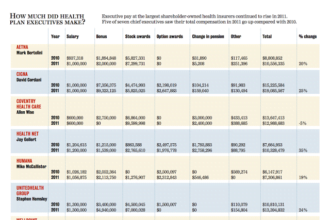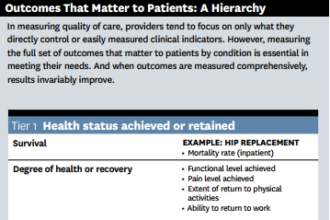
All aspects of health care delivery and financing are undergoing change at breakneck speeds. Even federal health care financing programs, not known for nimble maneuverability, are exploring future changes.

All aspects of health care delivery and financing are undergoing change at breakneck speeds. Even federal health care financing programs, not known for nimble maneuverability, are exploring future changes.
Over the past couple of decades, the federal government has come to recognize that not every Medicare beneficiary’s health care services in a given year cost the same as every other beneficiary’s. For beneficiaries enrolled in traditional Medicare, the government pays most of the cost of that care — whether it’s a lot or a little, whether the beneficiary in question is relatively healthy or living with multiple chronic conditions. It is of course our collective goal to target care to Medicare beneficiaries and others with multiple chronic conditions so as to alleviate their pain, so as to provide preventive care wherever possible, and so as to appropriately manage costs while maintaining a high level of quality of care.
For those Medicare beneficiaries who elect to enroll in Medicare Advantage plans (private sector health plans paid a premium by the Centers for Medicare and Medicaid Services (CMS) in return for being responsible for the cost of all care available under traditional Medicare, plus some additional benefits that may be designed by the plans, within certain limits), CMS pays risk-adjusted premiums (and has since 2000), based on the risk profile for the plan’s population during a base year (calculated based on demographic factors and health status). In theory, this means that each Medicare Advantage plan should not have to worry too much about adverse selection, because CMS will be paying it premium dollars not based on a mythical average Medicare beneficiary, but based on the risk pool served by that plan (or, for new plans, in that plan’s service area) in a prior year.
At the 30,000-foot level this is a rational approach to financing care for Medicare beneficiaries, but the devil, of course, is in the details. Just as it is not uncommon to hear an academic medical center respond to the latest ratings or rankings by commenting that the methodology did not properly account for the fact that its patients are sicker than average, Medicare Advantage plans operating within the risk adjustment regime have noted that they are often underpaid, considering the acuity of their member populations.
In October of last year, CMS announced that it was considering revising its risk adjustment methodology, effective 2017, in order to be more accurate. Medicare Advantage plans filed a significant volume of comments (available at the same link), and revisions may well find their way into regulation before next year.
Last month, an industry-sponsored study was released, suggesting that CMS underpays Medicare Advantage plans for the cost of caring for beneficiaries with multiple chronic conditions. For a sense of the scale of the issue, the study found that the risk-adjustment model used by the CMS underestimates the annual cost of treating chronic pain by $14.3 billion, osteoarthritis by $13.4 billion, depression by $8.9 billion and rheumatoid arthritis by $5.3 billion (that’s compared to approximately $150 billion spent on Medicare Advantage per year in total — in other words, the report effectively calls for a payment increase of over 25% based on these categories alone, which is, shall we say, unlikely).
Working within the current risk adjustment model (known as the CMS-HCC (hierarchical condition category) risk adjustment model), or working within a future variation on the current theme, Medicare Advantage plans need to get a better handle on the acuity of their beneficiary populations and need to get a better handle on managing their care. As the old saw would have it, you cannot manage what you do not measure. Accurately measuring and reporting beneficiary acuity is the first step forward — towards being accurately paid for the risk actually borne — for risk-bearing entities such as Medicare Advantage plans operated by insurance companies or, as is increasingly the case, health care provider organizations such as integrated delivery systems.
CMS has resisted some efforts regarding measurement and reporting in the recent past; some overly aggressive approaches taken by Medicare Advantage plans have resulted in government action against those plans, proposed changes in regulations and methodologies, and whistleblower lawsuits. Some changes to the CMS-HCC model may be made in response to the recent comments filed with CMS, but a sea change such as that sought by the regulated community is unlikely. In the absence of such broad change, Medicare Advantage plans need to be sure to accurately capture and report all relevant data. Working within the current framework, this is the key way in which plans may be assured of being paid fairly for the services they manage for the beneficiaries they cover. If they do not take this sort of proactive approach, they will forever be complaining — after the fact — that their members are sicker than average.
David Harlow
The Harlow Group LLC
Health Care Law and Consulting
A version of this post first appeared on the blog of Flow Health, a client. Flow Health works closely with risk-bearing entities including payors and providers to glean insights from health data concerning their beneficiaries and patients, helping them to collect and report data accurately in order to be paid appropriately in the future under Medicare Advantage and other programs. Contact Flow Health to learn more.








